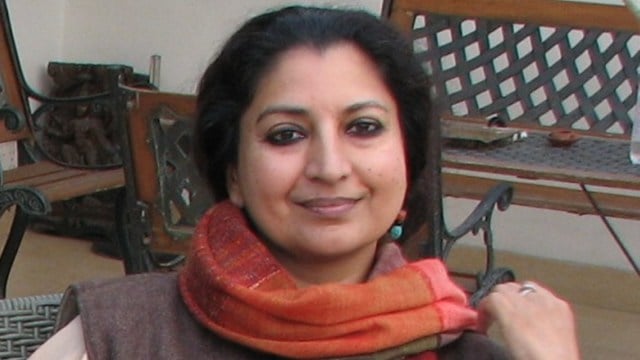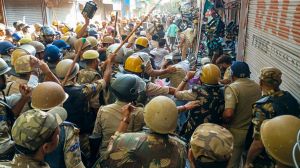‘We should not agonise about what is lost in translation’: Geetanjali Shree
The novelist on how to navigate writer's block, why translation is not about cloning the original text, and the skills necessary to write fiction
 Geetanjali Shree (Source: Wikimedia Commons)
Geetanjali Shree (Source: Wikimedia Commons)Last year, Geetanjali Shree made history by winning the 2022 International Booker Prize for translated fiction with her novel Ret Samadhi (Tomb of Sand), becoming the first South Asian non-English language novelist to receive this accolade. Translated into English by Daisy Rockwell, the novel follows the life of an 80-year-old Partition survivor who crosses borders to revisit her roots.
We had the opportunity to interview Geetanjali Shree on the sidelines of the Bait Al Zubair Narrative Days conference, hosted at Shangri-La Muscat, Oman, where she was the guest of honour. Edited excerpts:
How does Ret Samadhi, as the first Indian-language novel to win the Booker Prize, set a precedent for South Asian literature in the Western literary scene?
I never write with any agenda or aim, but I hope a novel from this part of the world will light up the entire region. The power traditionally has been with the West, but it might start to change. I think a wonderful moment full of tremendous possibilities, beyond momentary excitement, is opening up. An example that comes to my mind is how the tides turned when Colombian author Gabriel García Márquez got the Nobel Prize for Literature. The world discovered South American literature and its richness. I hope something similar happens.
There is also a lot more interest in translations at the moment. Readers are curious about the non-English South Asian literary space. Once this curiosity is picked up and nurtured by publishers, big players and translators, it will proactively build momentum.
What led you to explore Partition as a central theme?
I was not writing to bring out facts about Partition. These stories are a part of my formative years and the world I live in, a part of what is happening inside and outside me. It spontaneously found its way into my writing. It gradually got its voice and gait, becoming a novel about crossing all kinds of borders. For instance, the old woman’s character breaks the border that her home and family had become. The story of Rosie, a transgender character, is about crossing the gender border. Then there are women breaking age borders. Given the history and location of my existence, it also became a story about the India-Pakistan border at some point. So, I would say that not Partition, but the ‘border’, is the central theme. It is not just about any one nation, though. We are erecting borders all over the world that need to be broken and crossed.
 Geetanjali Shree’s book Tomb of Sand (Source: Geetanjali Shree)
Geetanjali Shree’s book Tomb of Sand (Source: Geetanjali Shree)
Can you give us an insight into your writing process?
I allow myself to discover hidden layers of my consciousness. I tap those while letting my intuition work its way, which comes from everything I am experiencing and observing — be it history, geography, or my readings. It is like a storehouse of creativity waiting to find its moment to emerge. I just place myself in that position, time and atmosphere where it can start expressing itself. Sometimes, it comes as a fascinating surprise to me when it unfurls. What might begin with a haze magically begins to build into something substantial — taking shape as characters and stories. I often quote one of the great musicians of our times, sarod maestro Ustad Ali Akbar Khan, who once said that, in the beginning, “I play the sarod, but after a while, the sarod plays me.”
With your novels being translated into numerous languages, what is gained and lost in translation?
I think we should not agonise too much about what is lost in translation. Something always changes when you move from one language to another. A word from another linguistic culture will throw up different images, histories, lineages, and feelings. So, even when there are literal meanings that a translation carries, it can mean something else in spirit, character and personality. It will mingle with something new to become another rich entity. Translation is not about producing a replica or a clone. It is making another living being that carries the culture of the earlier one in a new avatar. Daisy Rockwell — an American translator who works with Hindi and Urdu — has done some wonderful work where she carries the spirit and life of the earlier work in the translation.
What is your current project?
I have been working on a novel and trying to give it a final shape. Given my current schedule, it is a bit challenging to find time and solitude to finish it.
Who are the writers that have left a lasting impact on you?
It is not an easy question to answer because there are such great writers and books. There isn’t an exhaustive list, but writers near home have moved me and enriched my imagination. Many writers like Saadat Hasan Manto have taught us about fiction writing and humanity. I find writers who can combine personal and political spheres fascinating. I also enjoy reading transparent prose that states bare facts yet is a bit opaque, much like reality or truth.
The choice to write in Hindi, your native language, instead of English, which has a broader readership — what influenced it?
Fiction writing is a very intimate act. We choose the language closest to us, like our mother tongue. In my case, Hindi has been a part of my life, family, home, and school. When it came to expressing things so personally, it wasn’t even a matter of choice.
I don’t think a writer chooses a language based on popularity or readership. We write in the language in which we think and best express ourselves. A Konkani writer writing in their native language might have a niche circle, but they are doing it to express themselves in the best possible way. Of course, we believe and hope that readership extends with translations.
What prompted you to pursue writing as a profession, and what aspects of the craft drew you in?
I don’t think things are as set out in stone from the beginning. It just works itself out as the process of living guides you along. Writing is another way of expressing yourself — happiness, despair, questions, curiosity, doubts or confusion. All of us are trying to find a way that will help us make sense of our world. We choose a medium that gives us an outlet, a form of expression. For me, it was writing.
Have you encountered writer’s block, and if so, how did you navigate through it?
Every writer encounters it. They try not to be anxious, but there is always this faint feeling that this might be one final time you won’t get past it. As for me, I try to engage myself in something that relaxes and inspires me. I try to leave the process to do something far removed from writing, like watching a film, reading or enjoying quiet time with nature. However, it is hard to put a finger on what works and what does not.
What advice would you offer to aspiring writers, especially fiction writers?
This question takes me back to when I started as a writer. I feel writing is a personal journey with unique struggles, endeavours, enjoyments and achievements. A writer is someone who is not waiting for advice. Writers don’t want to write anything that has been written already or take a beaten track. But it is humbling to know that some of the things you think are new might have been done, maybe in a slightly different way. We can just attempt to be as unique and original as possible, which is why it is important to carve a niche.
One thing I can suggest is to make yourself sensitive and observant. As a thinking and feeling person, keep your senses alert and be as responsive as you can.





- 01
- 02
- 03
- 04
- 05


























